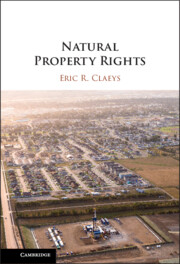
-
Select format
-
- Publisher:
- Cambridge University Press
- Publication date:
- April 2025
- April 2025
- ISBN:
- 9781108951395
- 9781108844499
- Dimensions:
- (229 x 152 mm)
- Weight & Pages:
- 0.68kg, 350 Pages
- Dimensions:
- Weight & Pages:
- Subjects:
- Law, Legal Philosophy, Philosophy, Property Law
You may already have access via personal or institutional login- Subjects:
- Law, Legal Philosophy, Philosophy, Property Law
Book description
Natural Property Rights presents a novel theory of property based on individual, pre-political rights. The book argues that a just system of property protects people's rights to use resources and also orders those rights consistent with natural law and the public welfare. Drawing on influential property theorists such as Grotius, Locke, Blackstone, and early American statesmen and judges, as well as recent work in in normative and analytical philosophy, the book shows how natural rights guide political and legal reasoning about property law. It examines how natural rights justify the most familiar institutions in property, including public property, ownership, the system of estates and future interests, leases, servitudes, mortgages, police regulation, and eminent domain. Thought-provoking and comprehensive, the book challenges leading contemporary justifications for property and shows how property both secures individual freedom and serves the common good.
Contents
Metrics
Full text views
Full text views help Loading metrics...
Loading metrics...
* Views captured on Cambridge Core between #date#. This data will be updated every 24 hours.
Usage data cannot currently be displayed.
Accessibility standard: Unknown
Why this information is here
This section outlines the accessibility features of this content - including support for screen readers, full keyboard navigation and high-contrast display options. This may not be relevant for you.
Accessibility Information
Accessibility compliance for the PDF of this book is currently unknown and may be updated in the future.

